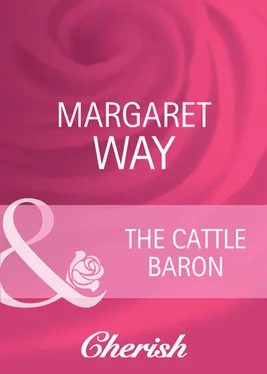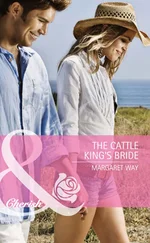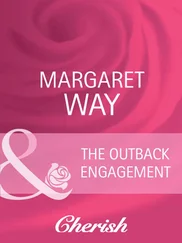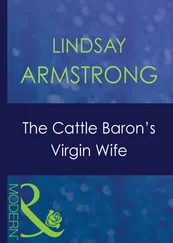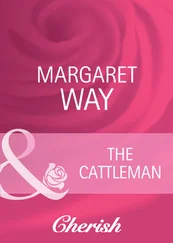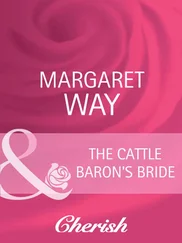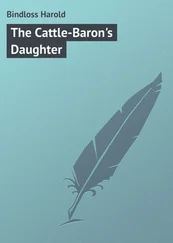Margaret Way - The Cattle Baron
Здесь есть возможность читать онлайн «Margaret Way - The Cattle Baron» — ознакомительный отрывок электронной книги совершенно бесплатно, а после прочтения отрывка купить полную версию. В некоторых случаях можно слушать аудио, скачать через торрент в формате fb2 и присутствует краткое содержание. Жанр: unrecognised, на английском языке. Описание произведения, (предисловие) а так же отзывы посетителей доступны на портале библиотеки ЛибКат.
- Название:The Cattle Baron
- Автор:
- Жанр:
- Год:неизвестен
- ISBN:нет данных
- Рейтинг книги:3 / 5. Голосов: 1
-
Избранное:Добавить в избранное
- Отзывы:
-
Ваша оценка:
- 60
- 1
- 2
- 3
- 4
- 5
The Cattle Baron: краткое содержание, описание и аннотация
Предлагаем к чтению аннотацию, описание, краткое содержание или предисловие (зависит от того, что написал сам автор книги «The Cattle Baron»). Если вы не нашли необходимую информацию о книге — напишите в комментариях, мы постараемся отыскать её.
The Cattle Baron — читать онлайн ознакомительный отрывок
Ниже представлен текст книги, разбитый по страницам. Система сохранения места последней прочитанной страницы, позволяет с удобством читать онлайн бесплатно книгу «The Cattle Baron», без необходимости каждый раз заново искать на чём Вы остановились. Поставьте закладку, и сможете в любой момент перейти на страницу, на которой закончили чтение.
Интервал:
Закладка:
Mick plonked down again and summoned the hovering waiter. “How do you know?” he countered gleefully. “You weren’t there.”
MICK STUCK to his promise for the hour they stayed on at the club, drinking soda water with a dash of bitters, wincing with every mouthful as though it was poison. As the place filled up and the other members became aware that Mick was as close to sober as he’d been in years, a lot of the old camaraderie returned.
Banfield was a generation younger than most of the others, but as his father’s son he’d had been granted full membership as a matter of course. Being heir to a vast station was one thing. Running it when Porter Banfield had almost brought it to the brink was another. It didn’t take Chase Banfield long, three years at most, to establish that he could take his place with the best of them. From the day he returned home from university with an honors degree in economics and business administration, he had taken to calling in at the club. Not to drink, although he always had time for a quick beer, but to talk to his fellow cattlemen. Or, as he admitted openly to much friendly banter, to “pick their brains.” These were top cattlemen like his father. He had much to learn. A month later he turned twenty-one, and his uncle Porter’s guardianship was over. John Chase Banfield was in full control of his inheritance—his trust fund, his father’s business portfolio and historic Three Moons station. It was also the day he evicted his uncle. At last he was free to take over the reins and restore Three Moons to its former position as one of the great cattle stations of the world’s leading beef-producing country. He was afire to succeed. He had the brains, the strength, the determination, and he was a very fast learner.
IT WAS ONLY a short four-mile trip from the club into the town of Isis, the drive winding through towering banks of bougainvillea gone wild. A veritable jungle of the ubiquitous cerise and deep-purple flowers, with their dangerous hooked thorns. A drawback certainly but they looked magnificent, brilliant foils for the soaring palms and vivid orange-scarlet of the flame-of-the-forest that lit up the bush. In this part of the world, an enormous range of bougainvillea cultivars, the Thai golds, the pinks, the bronzes, the burnt oranges and scarlets adorned home gardens, showy and relatively easy to handle, but they never assumed the incredible height and splendor of the original bougainvillea gone wild. His mother had planted bridal white when she first came to Three Moons, training it over walls and pergolas and the balustrades of the veranda. Now great billowing veils of it made an unforgettable sight.
His mother! Would he ever in his lifetime be released from the grief? The might-have-beens? But grief had to be lived with. He was a Banfield and it was up to him to carry on a proud tradition, which Porter had almost wrecked. He’d never seen his uncle grieve, but perhaps he had in private. Porter was a strange one, with his own inner life, layers and layers of secrets. He was incapable of showing affection, if indeed he actually felt emotion outside his love of precious objects, especially antiquities. Inanimate possessions were the thing, not human relationships. Chase couldn’t begin to understand his uncle. He had long since stopped trying.
The sun had lost the worst of its heat, the cloudless cobalt sky giving way to another glorious tropical sunset. There were Mick’s Spanish galleons sailing majestically above, sweeping down the sky, their sails billowing crimson and gold. Poor old Mick! He held out no real hope that Mick would show up for dinner. Probably someone would let him sleep it off at the club.
After he’d gone a mile, he turned off the side road and onto the highway, saluting as always his grandfather, the town’s founding father who’d had the foresight to line the route with royal palms. They soared a uniform eighty feet, forming a superb entry into the little rain-forest town. Then the poincianas suddenly replaced them, forming an interlocking canopy over the main street, turning the air rosy when they were in bloom. North of Capricorn was a fantasy world, a paradise, a celebration of nature. He had visited other parts of the world, sailed around the glorious South Pacific with two of his university friends, but there was nowhere on earth he’d rather be than the place he was born. Three Moons. His great-great-grandfather, Patrick Banfield, an Englishman in search of adventure, had named it after the three almost perfect moon-shaped lagoons on the vast selection he’d taken on from the colonial Queensland government. Their characteristic feature was magnificent water lilies, and Patrick Banfield had realized they would be easily seen from the Malaysian-style homestead he planned to build.
All kinds of water birds still thronged to the lagoons—ibis, egrets, pelicans, ducks, magpie geese, pygmy geese, the brolgas, the blue cranes that mated for life. There were no beautiful water lilies farther back, in the swamp country. There the surface was completely overgrown with aquatic plants, the thick vegetation hiding the waterfowl and the crocodiles. The common crocodile mostly, freshwater, harmless, living mainly on fish. But the big stream the Aborigines called Gongora, the place of the sacred crocodile on Three Moons coastal border, was home to a few estuarine crocs that weren’t particular about what they ate. Anything and everything that might come to drink at the water’s edge. Birds, reptiles, mammals, tortoises, cattle, men.
The station had suffered three crocodile-related disasters over the years, which was close to a miracle, considering no one seemed to heed the warnings. Victim one at the turn of the century—an unwary stockman. Another in the 1930s when a visiting English cousin deliberately went after the legendary Munwari, the gigantic sacred crocodile said to be thousands of years old. Ah, the thrill of the kill! Everyone had warned him not to interfere with the crocodiles, a species that had survived unchanged for more than 150 million years, but according to the cousin, this was even better than hunting rhino in Africa. He’d made it to the upper reaches of Gongora, deep into country few white men had ever traveled; he’d never returned. A large search had been mounted, but it was as though he’d vanished from the face of the earth. The Aboriginal version of events was that the earth and not the Great Spirit guardian had swallowed him up; either way, he was never seen again. His story was part of the saga of the Wilderness Coast. A zoologist, the author of many scientific papers on reptiles, including crocodiles, lost a leg right up to the thigh in the course of his study of Munwari. That was in his father’s day. Porter had never allowed anyone else onto the station after that. Chase didn’t intend to, either, and that included Dr. Graeme Marley.
The last time, and it had to be two years, Marley had tried calling him. No go, especially when Marley had used Porter for a reference. Now Marley had decided to show up in person with his girlfriend in tow.
Girlfriend? Surely he’d seen a photograph someplace of Marley and a wife? A little brown hen to Marley’s peacock. It could even have been on TV. Marley had made quite a few appearances after he’d discovered and dated the Winjarra paintings. Ah! He remembered now. There was a journalist involved. A young woman. Banfield started to make the connections. A redhead. His mind ranged back over Mick’s description. Masses of orange hair. Obviously she wasn’t bothered by the fact that Marley was a married man.
Well, time hadn’t changed his mind. He had no intention of allowing Dr. Marley and his girlfriend to run around Three Moons uncovering more bric-a-brac. Probably stuff buried by poor old Porter, whose imagination worked on overdrive. Porter might be obsessed with “proving” the existence of some ancient Egyptian village in the wilds of the up-country, a real no-man’s-land; Chase was far more interested in what was happening on Three Moons here and now. The mustering had to be completed before the onset of the Wet between December and March. They were well into September, spring in the state capital, Brisbane, more than a thousand miles away. Life at Three Moons was dictated by the season. The Wet and the Dry. A creek that was little more than a trickle in the Dry could become a raging torrent in the Wet. If a cyclone blew in from the Coral Sea to the east, the Timor to the north, the Indian Ocean to the west, all hell broke loose. It was either one thing or the other—drought or flood—presided over by the timeless culture of the Aborigines. Banfield had great respect for the Aborigines and great sympathy for them as they coped with the problems that beset them as traditional life broke down. It wasn’t easy trying to adapt to the white man’s culture, almost diametrically opposed to their own. Aborigines were intimately attuned to the land. They weren’t terribly receptive to material gain. But they were the backbone of the big stations, splendid stockmen, trackers, horse breakers. The bush owed them a great debt. His childhood mentor had been Moses, not his uncle Porter. Moses was Three Moon’s leading stockman, the most loyal of employees and a tribal elder. Moses had been asked to look out for him in his childhood days when he’d been running wild. Moses had taken the job very seriously. Banfield didn’t know what he would’ve done without him in those first terrible years after he’d lost his parents and Porter had withdrawn to a place inside himself that could not be reached. Moses was a remarkable man. In many ways a foster father. It was men like Moses who had helped him win the battle to reestablish Three Moons.
Читать дальшеИнтервал:
Закладка:
Похожие книги на «The Cattle Baron»
Представляем Вашему вниманию похожие книги на «The Cattle Baron» списком для выбора. Мы отобрали схожую по названию и смыслу литературу в надежде предоставить читателям больше вариантов отыскать новые, интересные, ещё непрочитанные произведения.
Обсуждение, отзывы о книге «The Cattle Baron» и просто собственные мнения читателей. Оставьте ваши комментарии, напишите, что Вы думаете о произведении, его смысле или главных героях. Укажите что конкретно понравилось, а что нет, и почему Вы так считаете.
